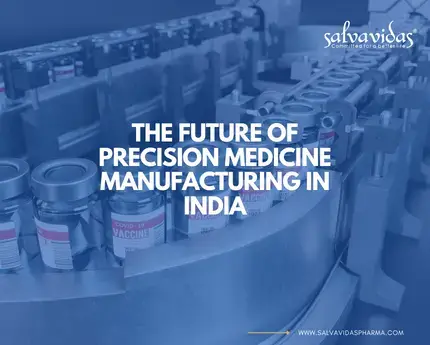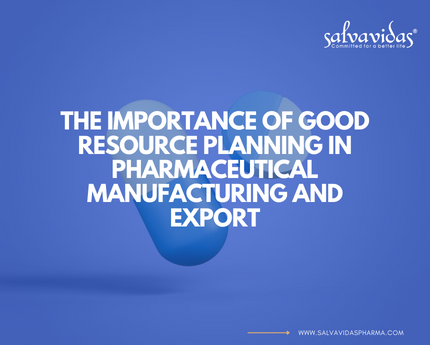
The Future of Precision Medicine Manufacturing in India Introduction: Precision medicine is the future of healthcare, where treatments are tailored to individual patients based on their genetic makeup, lifestyle, and environment. It offers the potential to improve patient outcomes, reduce healthcare costs, and accelerate the development of new therapies. As the demand for precision medicine is increasing globally, India has a unique opportunity to become a leading player in its manufacturing. This article explores the current state, opportunities, and challenges of precision medicine manufacturing in India. Current State of Precision Medicine Manufacturing in India: Precision medicine is still in its early stages in India, but the government and industry are taking steps to promote its development. The government launched the National Biopharma Mission in 2017 to accelerate biopharmaceutical research and development in the country. The mission includes initiatives to strengthen the scientific and clinical research ecosystem, develop infrastructure for biopharma manufacturing, and promote entrepreneurship in the sector. The industry is also investing in precision medicine manufacturing, with several companies setting up research and development centers and manufacturing facilities in India. Opportunities for Precision Medicine Manufacturing in India: India has several advantages that make it an attractive destination for precision medicine manufacturing: Large patient pool: India has a population of over 1.3 billion, which provides a large patient pool for clinical trials and drug development. Cost advantage: The cost of manufacturing in India is significantly lower than in developed countries, which makes it an attractive destination for precision medicine manufacturing. Skilled workforce: India has a large pool of skilled scientists, engineers, and healthcare professionals who can contribute to the development of precision medicine. Regulatory environment: The Indian government is taking steps to streamline the regulatory environment for biopharmaceuticals, which will make it easier for companies to develop and manufacture precision medicine. Challenges for Precision Medicine Manufacturing in India: Despite the opportunities, there are several challenges that need to be addressed to realize the full potential of precision medicine manufacturing in India: Infrastructure: India needs to develop the infrastructure for precision medicine manufacturing, including research and development facilities, clinical trial centers, and manufacturing facilities. Intellectual property rights: India has a complex intellectual property rights regime, which makes it difficult for companies to protect their innovations and investments. Quality standards: India needs to develop and enforce quality standards for precision medicine manufacturing to ensure patient safety and product efficacy. Funding: Precision medicine requires significant investment in research and development and manufacturing facilities. India needs to attract more investment in the sector to realize its potential. Frequently Asked Questions (FAQS): Q. What is precision medicineA. Precision medicine is an approach to healthcare where treatments are tailored to individual patients based on their genetic makeup, lifestyle, and environment. Q. What are the advantages of precision medicine?A. Precision medicine offers the potential to improve patient outcomes, reduce healthcare costs, and accelerate the development of new therapies. Q. What are the challenges of precision medicine manufacturing in India?A. The challenges include the need to develop infrastructure, address intellectual property rights, enforce quality standards, and attract more investment in the sector. Conclusion: Precision medicine is transforming the healthcare industry, and India has a unique opportunity to become a leading player in its manufacturing. The government and industry need to address the challenges and capitalize on the opportunities to develop a robust precision medicine ecosystem in India. With the right policies and investments, India can become a global hub for precision medicine manufacturing and contribute to the advancement of healthcare worldwide. The Future of Precision Medicine Manufacturing in India is promising, and we should expect to see significant growth in the sector in the coming years. It is an exciting time for precision medicine, and India has the potential to play a significant role in shaping its future. As precision medicine becomes more widespread, we can expect to see better patient outcomes, reduced healthcare costs, and a more efficient healthcare system. It is a win-win situation for everyone involved, from patients to healthcare providers, researchers, and investors. In conclusion, the future of precision medicine manufacturing in India is bright, but it will require concerted efforts from all stakeholders to realize its full potential. By investing in infrastructure, developing quality standards, protecting intellectual property, and attracting more investment, India can become a global leader in precision medicine manufacturing. The benefits will be significant, and the potential for improving patient outcomes and advancing healthcare is enormous. The Future of Precision Medicine Manufacturing in India is indeed exciting, and we should all look forward to the progress and advancements that lie ahead.

Good planning for resources is key in pharma manufacturing & export. The Importance of Good Resource Planning in Pharmaceutical Manufacturing and Export Resource planning is critical in any industry, but it becomes even more important in pharmaceutical manufacturing and export. In this highly regulated industry, managing resources effectively can be the difference between success and failure. Good resource planning can help pharmaceutical companies save time and money, improve efficiency, and ensure compliance with regulations. In this article, we will discuss the importance of good resource planning in pharmaceutical manufacturing and export. What is Resource Planning in Pharmaceutical Manufacturing? Resource planning is the process of identifying and allocating the resources needed to produce a pharmaceutical product. These resources can include personnel, raw materials, equipment, facilities, and time. Resource planning is crucial in pharmaceutical manufacturing because it ensures that there are enough resources to meet production demands while minimizing waste. Why is Resource Planning Important in Pharmaceutical Manufacturing? Resource planning is important in pharmaceutical manufacturing for several reasons. Firstly, it helps companies save time and money by identifying potential problems before they occur. By having a clear plan for resource allocation, companies can optimize their processes and reduce waste. This can lead to significant cost savings over time. Secondly, good resource planning improves efficiency. By having a clear plan for resource allocation, companies can ensure that their processes are streamlined and optimized. This can lead to faster production times, which can be critical in the pharmaceutical industry. Finally, resource planning is essential for ensuring compliance with regulations. The pharmaceutical industry is highly regulated, and companies must comply with strict guidelines to ensure the safety and efficacy of their products. Good resource planning can help companies meet these regulations by ensuring that all necessary resources are available and that all processes are properly documented and tracked. How to Develop a Resource Plan for Pharmaceutical Manufacturing? Developing a resource plan for pharmaceutical manufacturing requires careful consideration and planning. The following steps can be helpful in developing a resource plan: Identify the scope of the project – Define the project objectives, the products to be manufactured, and the timelines for production. Determine the resources required – Identify the personnel, raw materials, equipment, facilities, and time required for the project. Allocate resources – Assign resources to specific tasks and determine how they will be used throughout the project. Develop a schedule – Create a timeline for the project, including start and end dates, milestones, and critical tasks. Monitor and adjust the plan – Continuously monitor the progress of the project and adjust the plan as necessary to ensure that the project remains on track. Benefits of Good Resource Planning in Pharmaceutical Manufacturing Good resource planning can provide several benefits to pharmaceutical companies, including: Cost savings – Good resource planning can help companies save money by optimizing their processes and reducing waste. Efficiency – By having a clear plan for resource allocation, companies can improve their efficiency and reduce production times. Compliance – Resource planning can help companies ensure compliance with regulations by ensuring that all necessary resources are available and that all processes are properly documented and tracked. Challenges in Resource Planning in Pharmaceutical Manufacturing Resource planning in pharmaceutical manufacturing can be challenging for several reasons, including: Regulatory requirements – The pharmaceutical industry is highly regulated, and companies must comply with strict guidelines to ensure the safety and efficacy of their products. This can make resource planning more complex. Short product life cycles – Pharmaceutical products typically have short life cycles, which can make it challenging to plan for resources over the long term. Uncertainty – The pharmaceutical industry is constantly evolving, and there is often a high degree of uncertainty around product demand and market conditions. Conclusion In conclusion, good resource planning is critical in pharmaceutical manufacturing and export. It can help companies save time and money, improve efficiency, and ensure compliance with regulations. Developing a resource plan requires careful consideration and planning, but the benefits can be significant. By following the steps outlined in this article and continuously monitoring and adjusting the plan as necessary, pharmaceutical companies can optimize their processes and achieve success in this highly competitive industry. FAQs: Q. What are the key resources required for pharmaceutical manufacturing?Ans: The key resources required for pharmaceutical manufacturing include personnel, raw materials, equipment, facilities, and time. Q. How can resource planning improve compliance with regulations in the pharmaceutical industry?Ans: Resource planning can help companies meet regulatory requirements by ensuring that all necessary resources are available and that all processes are properly documented and tracked. Q. How can resource planning help pharmaceutical companies save money?Ans: Good resource planning can help pharmaceutical companies save money by optimizing their processes and reducing waste. Q. Why is it important to continuously monitor and adjust the resource plan in pharmaceutical manufacturing?Ans: The pharmaceutical industry is constantly evolving, and there is often a high degree of uncertainty around product demand and market conditions. Continuously monitoring and adjusting the resource plan can help companies adapt to these changes and remain competitive. Q. What are some common challenges in resource planning in the pharmaceutical industry?Ans: Some common challenges in resource planning in the pharmaceutical industry include regulatory requirements, short product life cycles, and uncertainty around product demand and market conditions.

The Importance of Good Supply Chain Management in Pharmaceutical Manufacturing and Export Introduction: The pharmaceutical industry is one of the most complex industries in the world. It involves a lot of research, development, testing, and regulatory compliance before the final product can be brought to market. However, one aspect that is often overlooked is the supply chain management aspect of the industry. Supply chain management is the process of overseeing and optimizing the flow of goods, services, and information from the point of origin to the point of consumption. In the world of pharmaceutical manufacturing and export, good supply chain management is crucial to ensuring that the products are delivered on time, in the right condition, and at the right cost. The Challenges of Pharmaceutical Supply Chain Management Complex Regulatory Requirements High Level of Traceability and Product Integrity Managing Inventory and Production Transportation and Logistics Variability in Demand and Supply The Benefits of Good Supply Chain Management in Pharmaceutical Manufacturing and Export Enhanced Productivity and Efficiency Improved Quality Control Better Cost Management Increased Customer Satisfaction Competitive Advantage Key Elements of a Successful Pharmaceutical Supply Chain Demand Planning Inventory Management Production Planning and Scheduling Warehousing and Distribution Transportation and Logistics Information Technology Systems Ensuring Compliance in Pharmaceutical Supply Chain Management Regulatory Compliance Security and Risk Management Quality Management Supply Chain Transparency Auditing and Monitoring Bullet Points: Good supply chain management is essential for successful pharmaceutical manufacturing and export. The pharmaceutical industry is complex and requires efficient supply chain management. Challenges in the pharmaceutical supply chain include regulatory compliance, product integrity, and variability in demand and supply. The benefits of good supply chain management include increased efficiency, quality control, and customer satisfaction. Key elements of a successful pharmaceutical supply chain include demand planning, inventory management, and transportation and logistics. Ensuring compliance in pharmaceutical supply chain management requires regulatory compliance, security and risk management, and quality management. FAQs: Q. What is the importance of supply chain management in pharmaceutical manufacturing and export? A. Good supply chain management is essential to ensure that pharmaceutical products are delivered on time, in the right condition, and at the right cost. Q. What are the challenges in pharmaceutical supply chain management? A. The challenges in pharmaceutical supply chain management include regulatory compliance, product integrity, and variability in demand and supply. Q. What are the benefits of good supply chain management in pharmaceutical manufacturing and export? A. The benefits of good supply chain management include increased efficiency, quality control, and customer satisfaction. Conclusion: In conclusion, good supply chain management is critical to the success of pharmaceutical manufacturing and export. It requires careful planning, monitoring, and optimization of the flow of goods, services, and information. By ensuring compliance, managing inventory, and utilizing key elements such as demand planning and transportation logistics, pharmaceutical companies can enjoy increased efficiency, quality control, and customer satisfaction. In today’s competitive market, good supply chain management is no longer a luxury but a necessity.

0